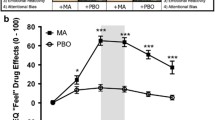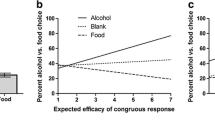Abstract
This paper reviews the classical conditioning of drug reactions, with special emphasis on the relationship of this phenomenon to drug addiction. Several aspects of drug addiction such as drug craving, high relapse tendencies, and the recurrence of withdrawal symptoms are reviewed and interpreted in light of classical conditioning theory and data. A theory is proposed that attempts to account for various aspects of the addictive process. The implications and empirical methods for testing this theory are outlined.
Similar content being viewed by others
References
Bykov, K. M.: The Cerebral Cortex and the Internal Organs. New York Chemicle Publishing Co., 1957 (Trans. by W. H. Gantt).
Collins, K. H., and Tatum, A. L.: A conditioned reflex established by chronic morphine poisoning.Am. J. Physiol.,74:14, 1925.
Cook, L., and Kelleher, R. T.: Effects of drugs on behavior.Ann. Rev. Pharmacol,3:205, 1963.
Crisler, G.: Salivation is unnecessary for the establishment of the salivary conditioned reflex induced by morphine.Am. J. Physiol.,84:553, 1930.
Cullen, J. W.: Homeostasis-anhomeostasis: Goliath and David.Cond. Reflex,6:78, 1971.
Deese, J.: The Psychology of Learning. New York, McGraw-Hill, Inc. 1958.
Dews, P. B., and Morse, W. H.: Behavioral pharmacology.Ann. Rev. Pharmacol,1:145, 1961.
Dykman, R. A., and Gantt, W. H.: Experimental psychogenic hypertension blood pressure changes conditioned to painful stimuli (Schizokinesis).Bull. Johns Hopkins Hosp.,107:72, 1960.
Finch, G.: Salivary conditioning in atropinized dogs.Am. J. Physiol.,124: 136, 1938.
Finch, G.: Pilocarpine conditioning.Am. J. Physiol,124:679, 1938.
Fleck, S., and Gantt, W. H.: Fractional conditioning of behavior based on electrically induced convulsions.Fed. Proc.,8:47, 1949.
Gantt, W. H.: Experimental Basis for Neurotic Behavior. P. Hoeber, New York, 1944.
Gantt, W. H.: A physiological basis for nervous dysfunction.Bull. Johns Hopkins Hosp.,82:416, 1948.
Gantt, W. H.: Effect of alcohol on sexual reflexes of normal and neurotic male dogs.Psychosom. Med.,16:174, 1952.
Gantt, W. H.: Principles of nervous breakdown-schizokinesis and autokinesis.Ann. N.Y. Acad. Sci.,56:143, 1953.
Gantt, W. H.: Normal and abnormal Actaptations—homeostasis, schizokinesis, and autokinesis,Dis. Nerv. Syst. 18:7, 1957.
Gantt, W. H.: What the laboratory can teach us about nervous breakdown.In: Medicine in a Changing Society, New York, Iago Galdston, (Ed.), International University Press, 1957; pp. 72–110.
Gantt, W. H.: Cardiovascular component of the conditional reflex to pain, food and other stimuli.Physiol. Rev.,40:266, 1960.
Gantt, W. H.: Reflexology, schizokinesis and autokinesis.Cond. Reflex,1:57, 1966.
Gantt, W. H.: Psychopharmacology and conditional reflexes.Cond. Reflex,5:109, 1970.
Gantt, W. H.: Mechanisms of behavior,Cond. Reflex,5:171, 1970.
Gantt, W. H., Katzenelbogen, S., and Loucks, R. B.: An attempt to condition adrenalin hyperglycemia.Bull Johns Hopkins Hosp.,50:400, 1937.
Gantt, W. H., and Traugott, M.: Retention of cardiac, salivary and motor conditional reflexes.Am. J. Physiol,159:569, 1949.
Gollub, L. R., and Brady, J. V.: Behavioral pharmacology.Ann. Rev. Pharmacol,5:235, 1965.
Himwich, H. E., and Alpers, H. S.: Psychopharmacology.Ann. Rev. Pharmacol,10:313, 1970.
Hunt, H.: Methods for studying behavioral effects of drugs.Ann. Rev. Pharmacol,1:125, 1961.
Jaffe, J. H.: Drug addiction and drug abuse. In:The Pharmacological Basis of Therapeutics. New York, The Macmillan Co., L. Goodman and A. Gilman (Eds.) 1970; pp. 276–313.
Kleitman, N.: The influence of starvation on the rate of secretion of saliva elicited by pilocarpine, and its bearing on conditioned salivation.Am. J. Physiol.,82:686, 1927.
Kleitman, N., and Crisler, G.: A quantitative study of a salivary conditioned reflex.Am. J. Physiol,79:571, 1927.
Kumar, R., Stoleman, I. P., and Steinberg, H.: Psychopharmacology.Ann. Rev. Psychol,21:595, 1970.
Lindesmith, A. R.: Problems in the social psychology of addiction.In: Narcotics. New York, McGraw-Hill Book Co., D. M. Wilner and G. G. Kassebaum (Eds.), 1965; pp. 118, 139.
Livingston, A., and Gantt, W. H.: An attempt to condition components of urine formation in dogs.Cond. Reflex,3:241, 1968.
Lynch, J. J.: Overtraining in classical conditioning: A comparison of motor and cardiac systems in dogs,Cond. Reflex,1:266, 1966.
Lynch, J. J.: The cardiac orienting response and its relationship to the cardiac conditional response in dogs.Cond. Reflex,2:138, 1967.
Lynch, J. J., and Kakigi, S.: An analysis of temporal factors in Pavlovian conditioning. Implications for instrumental aspects of classical responding. Paper presented at the 8th Annual Meeting of the Society for Psychophysiological Research, Washington, 1968.
Mackenzie, T. M., and Gantt, W. H.: Cardiac acceleration to atropine cannot be conditioned.Fed. Proc. 9:83, 1950.
Mello, N. K.: Some aspects of the behavioral pharmacology of alcohol.In: D. Efron (Ed.), Psychopharmacology: A Review of Progress. Washington, D.C. U.S. Government Printing Office, 787–809, 1968.
Mulinos, M. G., and Lieb, C. C.: Pharmacology of learning.Am. J. Physiol. 90:456, 1929.
Murphree, O. D., and Newton, J. E. O.: Schizokinesis: Fragmentation of performance in two strains of pointer dogs.Cond. Reflex,6:91, 1971.
Murphree, O. D., Peters, J. E., and Dykman, R. A.: Effect of person on nervous, stable, and crossbred pointer dogs.Cond. Reflex,2:273, 1967.
Newton, J. E. O., and Gantt, W. H.: One-trial cardiac conditioning in dogs.Cond. Reflex,1:251–265, 1966.
Nicholas, J. R.: How opiates change behavior.Sci. Am.,212:80, 1965.
Olds, J., Disterhoft, J. F., Segal, M., Kornblith, C L., and Hirsh, R.: Learning centers of rat brain mapped by measuring latencies of conditioned unit responses.J. Neurophysiol.,35:202, 1972.
Osgood, C.: Method and Theory in Experimental Psychology. New York, Oxford University Press, 1962.
Pavlov, I. P.: Conditioned Reflexes. Trans. by G. Anrep, New York, Oxford University Press, 1927.
Pavlov, I. P.: Lectures on Conditioned Reflexes. Trans. by W. H. Gantt, New York, International Publishers, 1928.
Russell, R. W.: Psychopharmacology,Ann. Rev. Psychol.,15:87, 1964.
Schuster, C. R., and Villarreal, J. E.: The experimental analysis of opiod dependence.In Psychopharmacology: A Review of Progress. Washington, D.C.: U.S. Government Printing Office, D. Efron (Ed.); pp. 787–809, 1968.
Teitelbaum, H. A.: Psychosomatic Neurology, Grune and Stratton, New York, 1964.
Teitelbaum, H. A., and Gantt, W. H.: Intravenous (cerebral sinus) injection of drugs from a distance.Trans. Am. Neurol. Assoc.,72:, 1948.
Teitelbaum, H. A., and Gantt, W. H.: A method of intravenous injection of drugs from a distance in conditional reflex studies.Science,113:603, 1951.
Teitelbaum, H. A., Gantt, W. H., and Stone, S.: Cardiac conditional reflexes can be formed to pain but not to acetylcholine.J. Nerv. Ment. Dis.,123: 484, 1956.
Teitelbaum, H. A., and Gantt, W. H.: Emotional motivation in conditional reflexes and homeostasis: Its significance in learning and in psychopathology of Mental Development, Grune and Stratton, 1967.
Weiss, B., and Laties, V.: Behavioral pharmacology and toxicology,In Annual Review of Pharmacology, Henry W. Elliott, Windsor, C. Cutting and Robert Streisbach (Eds.),9:297, 1969.
Wikler, A.: Recent progress in research on the neurophysiological basis of morphine addiction.Am. J. Psychiat.,105:329, 1948.
Wikler, A.: Conditioning factors in opiate addiction and relapse. In Narcotics, New York, McGraw-Hill, D. M. Wilner and G. G. Kassebaum (Eds.), 1965; pp. 85–100.
Wikler, A.: Some implications of conditioning theory for problems of drug abuse.In Abuse Data and Debate. C. C. Thomas, Springfield P. H. Blackly (Ed.), 1970; pp. 104–113.
Wikler, A.: Some implications of conditioning theory for problems of drug abuse.Rehav. Sci.,16:92, 1971.
Wikler, A., Pescor, P. T., Miller, D., and Norrell, H.: Persistent potency of a secondary (conditioned) reinforcer following withdrawal of morphine from physically dependent rats.Psychopharmacologia,20:103, 1971.
Zubkov, A. A., and Zilov, G. N.: The role of conditioned reflex adaptation on the origin of hyperergic reactions.Bull I Riologic et al, Medicine Experimentale,4:294, 1937.
Author information
Authors and Affiliations
Additional information
The writing of this paper was supported in part by contract number DActa 17-73-C-3030 from the U.S. Army.
Rights and permissions
About this article
Cite this article
Lynch, J.J., Fertziger, A.P., Teitelbaum, H.A. et al. Pavlovian conditioning of drug reactions: Some implications for problems of drug addiction. Conditional Reflex 8, 211–223 (1973). https://doi.org/10.1007/BF03000677
Issue Date:
DOI: https://doi.org/10.1007/BF03000677




